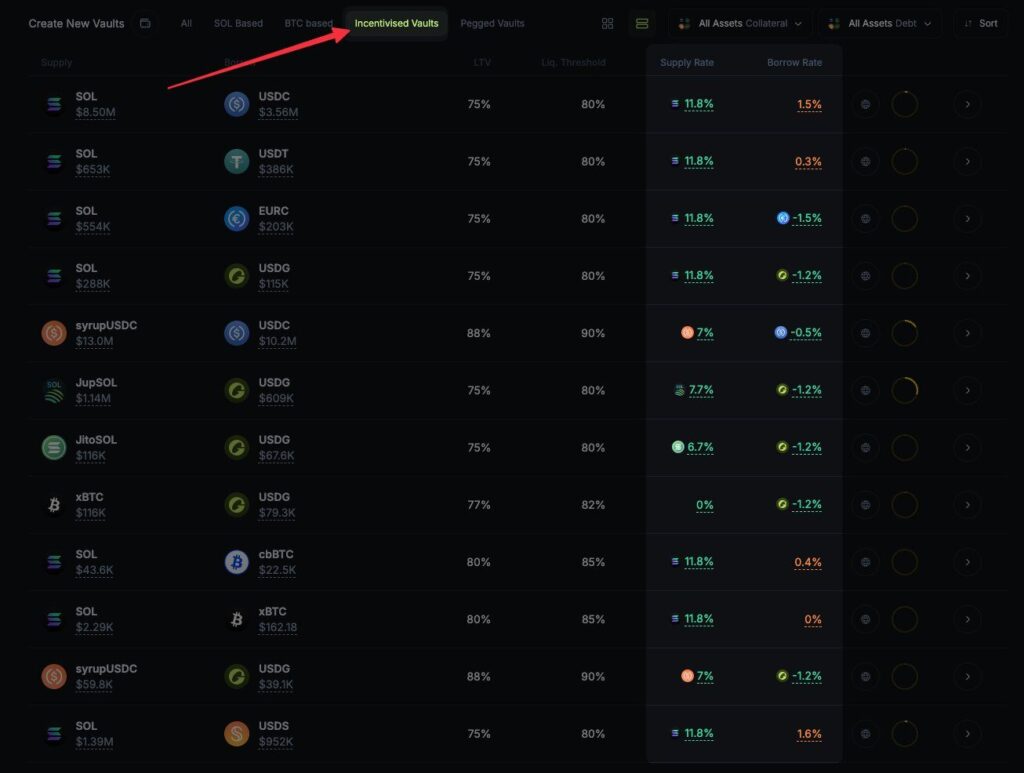Jupiter Lend: Your Guide to Lending and Borrowing on Solana
Jupiter Lend gives you access to high yields and flexible borrowing on Solana. You connect your wallet, deposit assets, and start earning or borrowing right away. This platform stands out with its high loan-to-value ratios and low liquidation risks.
What Is Jupiter Lend?

You find Jupiter Lend as part of the Jupiter Exchange ecosystem on Solana. It acts as a money market where you lend assets to earn interest or borrow against your holdings. Built with Fluid, it handles over 40 vaults for different tokens like USDC, SOL, and JUP. Lenders deposit funds into earn vaults that automatically route to the best pools for returns. Borrowers use collateral to access liquidity with up to 95% LTV, which means you borrow more against what you put in compared to other platforms. Liquidation penalties stay at just 0.1%, so you avoid big losses during market dips. The setup isolates risks per vault, keeping your positions safer.
Jupiter Lend launched its private beta in early August 2025 for waitlist users, with caps like $1 million per vault. Now in public beta, it opens to everyone with expanded assets and incentives. You see it as an extension of Jupiter’s tools, including swaps and perpetuals. This integration lets you move between trading and lending without leaving the site.
Key Features of Jupiter Lend

You get tools that make DeFi simpler and more efficient. Here’s what sets it apart:
- High LTV for Borrowing: Borrow up to 95% of your collateral’s value. This beats the usual 75% on other platforms, giving you more liquidity.
- Low Liquidation Penalties: Only 0.1% of your position liquidates to adjust margins. You never face full wipeouts, even in volatile times.
- Earn Vaults: Deposit once, and the system auto-routes your funds across pools for the best yields. No need to monitor or switch manually.
- Multiply Vaults: Create leverage loops with one click. You borrow against deposits and reinvest for higher returns, but watch the risks.
- Incentives: Over $2 million in rewards from Jupiter, Fluid, and partners boost APYs during launch. Stables like USDC offer 22-48% APY right now, though rates drop as more users join.
- JUP Collateral: Use your JUP tokens as collateral to borrow USDC. You keep exposure to JUP’s growth without selling.
- Mobile Alerts: If you use the Jupiter app, you get notifications when positions near liquidation.
These features push Jupiter Lend ahead in Solana DeFi. You handle everything in one place, from lending stables to leveraging SOL.
| Feature | Benefit | Example |
|---|---|---|
| 95% LTV | Borrow more | Deposit $100 SOL, borrow $95 USDC |
| 0.1% Penalty | Lower losses | Market dip triggers tiny adjustment |
| Auto-Routing | Optimal yields | System picks top pools for your deposit |
| Incentives | Boosted APY | Extra rewards on USDC vaults |
How to Get Started with Jupiter Lend
You need a Solana wallet and some assets. Follow these steps.
Step 1: Set Up Your Wallet
Download a wallet like Phantom or Solflare. Fund it with SOL for gas fees and tokens like USDC or JUP for lending. Buy them on Jupiter Swap if you lack any.
Step 2: Access the Platform
Go to lend.jup.ag. Connect your wallet. You see tabs for Earn, Borrow, and Multiply. The dashboard shows current APYs, total supply, and your positions.
Step 3: Verify Security
Check audits. Jupiter completed one audit with three more ongoing. Use hardware wallets for large amounts. Start small to test.
How to Lend Assets on Jupiter Lend
You earn yields by supplying assets. Pick a vault, like USDC Earn. Enter the amount and confirm. The platform auto-optimizes for the highest returns. Yields compound daily or weekly, depending on the vault. Withdraw anytime, but watch for utilization rates that affect APY.
For example, deposit USDC into a stable vault. You earn 22-29% APY now, plus incentives. The system routes your funds across Solana pools. No manual work needed.
How to Borrow Assets on Jupiter Lend
Deposit collateral first, like SOL or JUP. Then borrow USDC or other tokens. Set your amount within the LTV limit. Monitor health factor to avoid liquidation. Oracles from Pyth keep prices accurate.
Say you deposit JLP (Jupiter Liquidity Provider tokens). Borrow USDC against it while still earning JLP yields. Repay anytime to unlock collateral.
Using Multiply Vaults for Leverage
You loop positions for higher exposure. Deposit SOL, borrow USDC, swap to more SOL, and repeat—all in one transaction. This amplifies gains but also losses. Use it if you know markets well. Start with low leverage, like 2x, to test.
Risks and Safety Tips
Markets fluctuate. High LTV means faster liquidations in downturns. Smart contract bugs exist, though audits help. Don’t deposit more than you afford to lose. Diversify vaults. Enable notifications for position alerts.
Jupiter isolates vaults, so one bad asset doesn’t affect others. Liquidations only touch 0.1% to fix margins, giving you time to adjust.
Current Incentives and Yields
You find boosted APYs during beta. Stables hit 40-48% with rewards. JUP holders get extra utility by borrowing without selling. Total supply crossed $100 million in hours after public launch. Partners add $2 million in incentives across vaults.
Yields change with demand. Check the dashboard often. Early users grabbed 100% APY on some stables, but rates settle as TVL grows.
Why Jupiter Lend Fits Solana DeFi
You benefit from Solana’s speed and low fees. Transactions cost pennies and confirm fast. Jupiter integrates lending with its aggregator, perps, and mobile app. This creates a full DeFi hub. Community feedback shapes updates—post suggestions on their forum.
Final Thoughts on Jupiter Lend
You now know how to use Jupiter Lend for lending, borrowing, and leveraging on Solana. Deposit, earn, or borrow today. Track your positions closely. This platform evolves, so stay updated via their site. If you hold idle assets, put them to work here.






